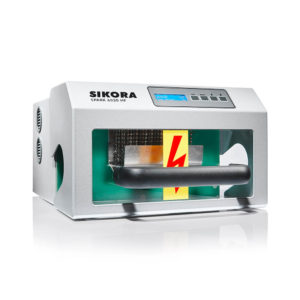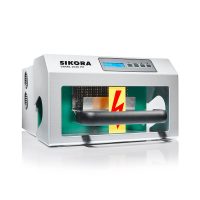Testing the dielectric strength of cable insulation
Polymeric insulation materials such as polyethylene (PE) or polyvinyl chloride (PVC) have an individual limit, depending on thickness or ambient conditions, up to which an electric field strength can be applied without breakdown, and thus structural damage to the material.
If the dielectric strength is exceeded, the conductivity skyrockets. The insulator is irreversibly damaged under electrical sparking, with unforeseeable consequences for the respective installation:
- Defects of all kinds
- Production downtime
- complicated exchange of cables
- Fires
- Insurance claims
How to achieve high dielectric strength?
The greater the specific electrical resistance of the insulating material, the higher the dielectric strength. Materials in this category include ceramics and glass, oils and plastics.
Which plastics have the highest specific electrical resistance?
The cable industry uses polyvinyl chloride (PVC), polypropylene (PP) and polyethylene (PE) materials, among others, which have ascending specific electrical resistances and resulting dielectric strengths of 10 to 30 kV/mm, in that order.
How to test the dielectric strength?
Perfect insulation is not only visible quality, but serves in particular the proper function and safety of cables. During extrusion, the insulation is therefore continuously tested by using high-voltage testing equipment (spark testers).
A spark tester is not used to test the dielectric strength limit, but rather the strength of the insulator when a test voltage is applied within the scope of the usual operating voltages. It is also possible to detect punctual defects or even bare spots.
For testing, the dry cable passes through a ball chain electrode inside the spark tester, which is typically installed after the cooling section or at the end of production, in rewinding lines. During this process, the cable insulation is exposed to the selected test voltage with an electric field. Insulation faults are reliably detected and documented so that only fault-free cables are delivered.
SIKORA’s product range includes high voltage testers with DC and AC voltage in various test frequencies, matched to diverse cable types and available with different ball chain electrodes.
DC voltage tester
For example, the SPARK 6020 DC and SPARK 2020 DC dc spark testers are used for testing thin wires such as telephone lines, data cables and mini-coax cables with foam insulation.
AC voltage tester
The SPARK 2000 BS AC voltage park tester is predestined for power cables manufactured with slow line speeds and larger diameters.
High frequency tester
The SPARK 6030 HF is a high-frequency, high-voltage test set especially for high-speed lines producing installation and automotive cables as well as signal cables.

Depending on the cable type and test regulation the user selects the suitable high voltage tester. All SIKORA Spark testers comply with all recognized test regulations (AS, BS, CS, CENELEC, EN, UL, VDE) and safety regulations (according to DIN/VDE 0800, IEC 479-1).
Function and safety test
Open operated measuring and testing devices must be checked regularly according to the European standard. A special feature of the SIKORA SPARK 6000 devices is the optionally integrated 3-stage function and safety test. Spark testers test the high voltage, the touch current and the function (sensitivity). While cable manufacturers used to have to use an external tester for these tests, a complete 3-stage self-test and calibration system is optionally integrated in the SPARK 6000. This test is documented, stored in the log file and can be retrieved at any time.
Interchangeable self test module
The function and self-test module integrated in the SPARK 6030 HF and SPARK 6020 DC can be easily replaced for recalibration. It is not necessary to send in the complete tester.
Advantages of the breakdown test with SIKORA
Breakdown testers are now an indispensable component for quality control and process optimization in extrusion lines:
- Ensuring the quality of the cable
- Compliance with safety standards
- Documentation and proof
- Avoidance of complaints and recourse claims

